- Why Must You Get A Mobile App Developed?
- Market Size Of Mobile Application
- The Basic Development Process That Affects Cost
- Mobile App Development Cost Based On App Types
- Mobile App Development Costs Based On Platform Types
- Mobile App Development Cost Based On Complexity Of Features
- Mobile App Development Cost Based On Development Time
- How Can The Cost Of App Development Be Determined?
- Tips To Reduce Mobile Application Development Cost
- Outsource Mobile App Development
- Things To Look Out For When Choosing an App Development Company
- 5 Best App Development Service Provider In Singapore
- Conclusion
- FAQ

With each passing day, the world becomes more interconnected, and smartphones play a pivotal role in this digital revolution. Singapore stands at the forefront of this dynamic landscape, witnessing a remarkable surge in mobile app development. While the cost of creating an app in Singapore cannot be overlooked, the potential rewards are well worth the investment. With our reliance on smartphones for a myriad of tasks, the demand for advanced, user-friendly apps has skyrocketed. From seamless shopping experiences to instant access to information, the realm of possibilities is boundless.
According to Statista, Singapore is projected to have an astounding 6.16 million smartphone users by 2028. With such a staggering number, the market for mobile app development in Singapore is undeniably thriving.
It’s worth noting that while the cost of app creation in Singapore may be more affordable compared to the United States, it still requires a substantial investment to engage the services of skilled app developers. This is why many individuals and businesses choose to outsource their app development needs to reputable firms based in Singapore.
When it comes to app development costs on a global scale, companies generally charge based on hourly rates. The average cost per hour can range anywhere from as low as $10 to as high as $250, depending on various factors. The total cost of developing an app is influenced by numerous factors, including the type of app, design complexity, the targeted platform, customization needs, developer expertise, and the overall development timeline.
App development in Singapore presents an exciting opportunity to tap into a vibrant market of mobile apps. By collaborating with skilled app developers, you can position yourself for success in this growing digital landscape.
If you have a brilliant app idea, don’t hesitate to explore the possibilities of app development in Singapore.
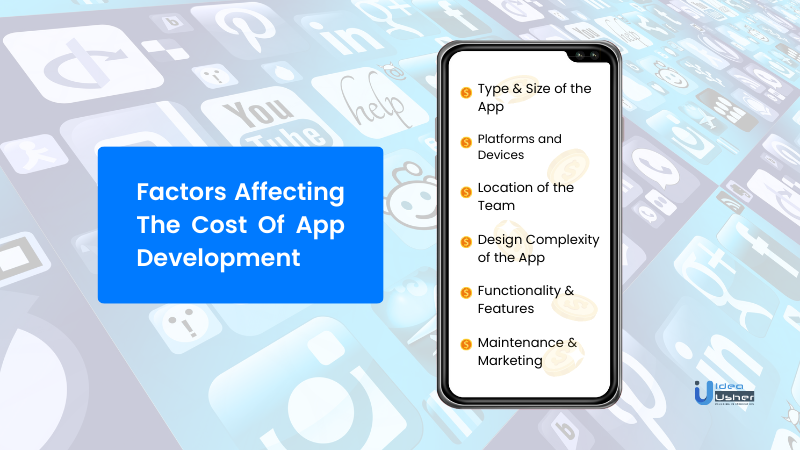
- Why Must You Get A Mobile App Developed?
- Market Size Of Mobile Application
- The Basic Development Process That Affects Cost
- Mobile App Development Cost Based On App Types
- Mobile App Development Costs Based On Platform Types
- Mobile App Development Cost Based On Complexity Of Features
- Mobile App Development Cost Based On Development Time
- How Can The Cost Of App Development Be Determined?
- Tips To Reduce Mobile Application Development Cost
- Outsource Mobile App Development
- Things To Look Out For When Choosing an App Development Company
- 5 Best App Development Service Provider In Singapore
- Conclusion
- FAQ
Why Must You Get A Mobile App Developed?
Mobile apps are essential for businesses of all sizes; they offer a number of benefits, including:
1. Reaching A Wider Audience
Mobile apps can help businesses reach a wider audience as more and more people are using their smartphones and tablets for everything from shopping to banking.
2. Providing A Better User Experience
Mobile apps offer a more personalized and engaging user experience than traditional websites. This is because apps can be optimized for specific devices and operating systems and can take advantage of features like push notifications and location-based services.
3. Improving Customer Service
Mobile apps can be used to provide better customer service by giving customers a way to contact businesses directly, track their orders, and get help with problems.
4. Increasing Sales
Mobile apps can help businesses increase sales by making it easier for customers to find and purchase their products or services. Businesses can also use apps to run targeted marketing campaigns and promotions.
5. Building Brand Awareness
Mobile apps can help businesses build brand awareness by giving them a way to connect with customers on a more personal level. Businesses can use apps to share their company’s story, showcase their products or services, and run contests and giveaways.
6. Increased Engagement
Mobile apps can help businesses keep their customers engaged by providing them with new content and features on a regular basis.
7. Improved Loyalty
Customers who use a business’s mobile app are more likely to become loyal customers.
8. Data Collection
Mobile apps can help businesses collect valuable data about their customers, which can be used to improve their products, services, and marketing campaigns.
If you are looking for a way to improve your business, developing a mobile app is a great way to start.
Market Size Of Mobile Application
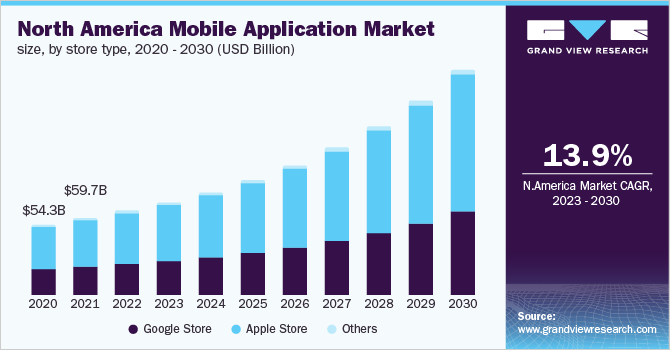
The market for mobile applications had a significant valuation of USD 206.85 billion in 2022, and it is projected to exhibit a compound annual growth rate (CAGR) of 13.8% from 2023 to 2030, indicating a promising trajectory for future expansion.
According to 42matters, there are 2,112 Singaporean mobile App developers active on Google Play, which is less than 1% of all 1,019,296 App developers on the platform.
According to another report, total revenue in the app market reached US$475.90bn in 2022 and is expected to show an annual growth rate (CAGR 2022-2027) of 8.58%, resulting in a projected market volume of US$755.50bn by 2027.
The surge we witness can be attributed directly to the widespread embrace of smartphones across the globe, coupled with the proliferation of mobile applications designed to enhance and simplify our daily lives. It’s an exponential ascent driven by our collective desire for convenience and connectivity.
The Basic Development Process That Affects Cost
The development process of a mobile app is a crucial factor that directly influences the budget. Understanding the various stages and their impact on costs can help you plan and allocate resources effectively. Here’s a breakdown of how each development step affects the cost:
1. Requirements Gathering And Analysis
- The level of detail and complexity in the requirements affects the cost.
- Unclear or incomplete requirements may require additional time for clarification, resulting in increased costs.
- Well-defined and detailed requirements minimize the risk of scope creep and costly changes.
2. Design
- The complexity and level of customization in the design impact the cost.
- Intricate and highly customized designs may require additional time and expertise, resulting in higher costs.
- Design variations for different platforms or screen sizes can increase complexity and cost.
3. Development
- The complexity of app features directly affects the cost.
- More complex features, integrations, or advanced programming techniques may require additional development time and specialized expertise.
- The time and expertise required contribute to the development cost.
4. Backend Development
- Mobile apps often require a backend server for data storage, user authentication, and server-side operations. The choice of backend technologies can impact development costs:
- Programming languages like Node.js, Ruby, and Python.
- Frameworks like Express, Ruby on Rails, and Django.
- Some technologies may require more expertise or have licensing fees, affecting the overall budget.
5. Third-Party Integrations
Integrating external services, APIs, or third-party platforms in your app can increase complexity and development costs. Third-party integrations may involve:
- Additional development time for implementing the integrations.
- Licensing fees for using certain services or APIs.
- Ongoing maintenance costs for keeping the integrations up to date.
6. Testing
- The level of testing and quality assurance efforts influence the cost.
- Thorough testing requires resources such as testing devices, automation tools, and dedicated testers.
- Complexity and platform support influence testing costs.
7. Deployment And Launch
- Platform-specific guidelines and requirements impact the cost.
- Additional time and effort may be needed to adhere to guidelines and complete necessary deployment steps.
- App store fees contribute to the overall cost.
8. Post-Launch Support And Maintenance
- Ongoing support and maintenance incur costs.
- The level of support depends on factors like user feedback, bug fixing, performance optimization, and updates.
- The complexity and scale of the app’s functionalities influence the cost.
- If your app requires some license, its integration, purchase, and over the time renewal cost will add up.
- This phase also includes marketing your application, which will impact and increase user engagement. This may lead to several other kinds of costs:
- Cost Per Install (CPI)
- Cost of Acquiring a loyal app user
- Cost of acquiring a paying subscriber on the subscription model
- You will also require to pay for hosting, whose cost may vary based on the bandwidth per user, bandwidth per MAU, backend requests cost & more.
Tips: The impact of each development step on cost can vary based on project-specific factors. Collaborating with experienced professionals can help assess the cost implications accurately and optimize the budget without compromising on quality.
Let’s have a look at the factors that affect the overall app development cost:
Mobile App Development Cost Based On App Types
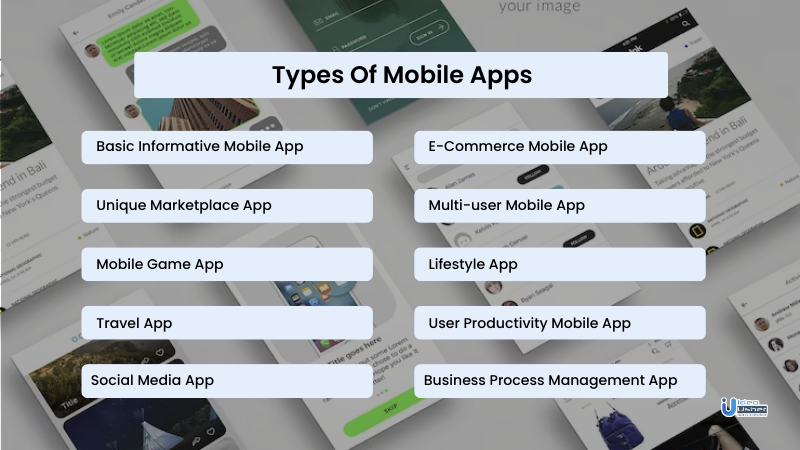
1. Basic Informative Mobile Apps
For individuals seeking a straightforward mobile app that provides essential information through a user-friendly interface, the development cost in Singapore falls within a reasonable range. These apps typically consist of a limited number of screens and do not require server connections. The development time for such apps is relatively short, allowing for a prompt launch.
2. E-Commerce or Shopping Mobile Application
In response to the growing popularity of e-commerce, investing in a dedicated shopping app can bring numerous advantages. The cost of developing an e-commerce app with essential features varies, allowing for flexibility based on project requirements. The development timeline is determined by the complexity of the desired functionalities.
3. Unique Marketplace Applications
Marketplace apps that seamlessly integrate various native mobile functionalities provide users with a superior experience. The cost of developing such apps is influenced by the complexity of features and the desired level of customization. The development timeline depends on the intricacy of the app’s components.
4. Multi-user Mobile Applications
Multi-user mobile applications that enable real-time interactions between users require meticulous attention to user interface design. The cost of developing these apps depends on the scale of functionalities and the level of customization. The development timeline is influenced by the complexity of features.
5. Mobile Game Applications
Creating mobile game apps demands expertise in various areas, including storyboard creation, animation, and programming. The cost and development timeline vary based on the complexity of the game, including its dimensionality and the integration of augmented reality or virtual reality elements.
6. Lifestyle Applications
Lifestyle apps are designed to assist users in enhancing their daily lives. They encompass a wide range of applications that cater to different aspects of personal improvement. These apps provide users with guidance and resources to adopt healthier lifestyles, discover new relationships, etc. The cost of developing such lifestyle apps in Singapore can vary depending on the included features. Typically, it can range from a moderate amount to a higher budget, especially if advanced AI algorithms are integrated to facilitate personalized experiences.
7. Travel Apps
Travel apps have become increasingly popular, offering convenient solutions for booking accommodations and flights. Despite the impact of the pandemic on the travel industry, travel apps continue to facilitate seamless bookings and accommodations worldwide. These travel apps function akin to marketplace platforms, connecting travelers with suitable services.
8. User Productivity Mobile Applications
With the increased demand for productivity management apps, professionals seek mobile solutions that enable efficient work management. The cost and development timeline depends on the specific functionalities and integration requirements of the app.
9. Social Media Apps
Social media apps present a distinct complexity compared to productivity apps due to their multi-user nature. These apps enable users to engage with others within the platform, distinguishing them from solitary-focused applications. For instance, some apps allow users to upload and interact with photos and videos shared by others, along with the ability to communicate through messaging features. Additionally, some apps provide account creation capabilities, facilitating communication between users of the app.
10. Business Process Management Applications
Business process mobile applications streamline and automate various organizational functions. The cost and development timeline are determined by the scope and complexity of the app’s features, such as customer relationship management or workforce management.
Mobile App Development Costs Based On Platform Types
When it comes to mobile app development costs in Singapore, the choice of platform plays a significant role in determining the overall budget. Here are some key considerations for different platform types:
1. iOS Development
- Developing an app specifically for iOS requires expertise in Swift or Objective-C programming languages.
- The cost may vary based on the complexity of the app, desired features, and design elements.
- Integration with Apple’s ecosystem, such as Apple Pay or SiriKit, may require additional development effort and impact the overall cost.
- The cost can be influenced by the need for platform-specific design elements and features that align with Apple’s user interface guidelines.
- Apple’s strict app review process ensures high-quality standards but can also extend the development timeline and costs.
- Ongoing maintenance and updates to ensure compatibility with new iOS versions should be factored into the long-term cost estimation.
2. Android Development
- Android app development involves programming in Java or Kotlin.
- The cost may be influenced by the app’s complexity, features, and design requirements.
- The wide range of devices and screen sizes in the Android ecosystem may require additional testing and optimization, which can affect the development cost.
- Integration with platform-specific features like Google Maps or in-app purchases through Google Play can impact the overall cost.
- Regular updates to support new Android versions and devices should be considered for long-term maintenance costs.
3. Cross-Platform Development
- Cross-platform frameworks like React Native, Flutter, or Xamarin allow simultaneous development for multiple platforms, reducing costs compared to separate native development.
- The cost depends on the app’s complexity, desired features, and the specific framework used.
- Cross-platform development can offer time and cost savings by leveraging shared codebases but may require additional customization for each platform.
4. Progressive Web Apps (PWAs)
- PWAs are web-based applications that offer app-like experiences across different devices and platforms.
- Costs for PWAs can be lower compared to native app development, as they leverage web technologies like HTML, CSS, and JavaScript.
- The development costs depend on the complexity of the app and the integration with device features, offline capabilities, as well as any additional integrations required.
- Compatibility testing across different browsers and devices should be factored into the overall cost estimation.
- PWAs offer the advantage of easy updates and maintenance as changes can be made to the web codebase, reducing long-term costs.
5. Hybrid Development
- These apps combine elements of both native and web-based development approaches.
- Hybrid apps often rely on web technologies but can access native device features through plugins or native bridge components.
- Frameworks like React Native, Flutter, Ionic, or PhoneGap enable building hybrid apps using web technologies.
- The selection of appropriate plugins and optimization for native functionality can impact the development cost.
- Regular updates and testing for compatibility with new platform versions should be considered for ongoing maintenance costs.
- The cost is influenced by the app’s complexity, features, and design requirements, as well as any additional integrations needed.
If you are considering investing in a native app and are seeking insightful statistics to guide your decision-making process, the following information can be of great help:
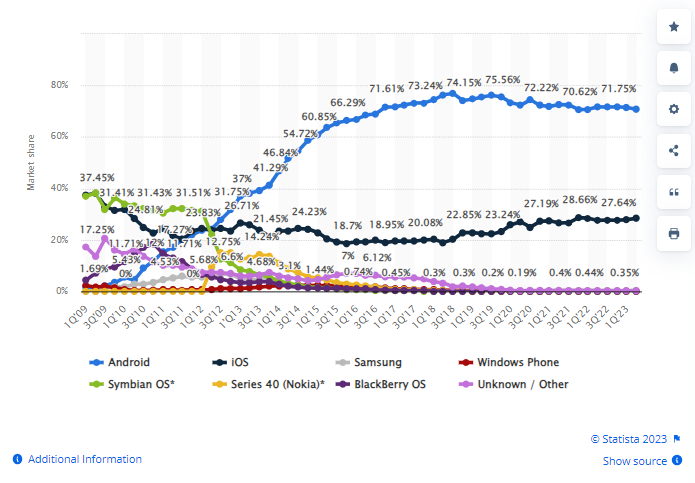
In the second quarter of 2023, Android continued to dominate as the top mobile operating system globally, boasting a remarkable market share of 70.8 percent. Meanwhile, iOS, the closest competitor from Apple, held a market share of 28.4 percent during this period, showcasing the ongoing rivalry between the two operating systems.
Here are some more stats representing the market share of the operating system:
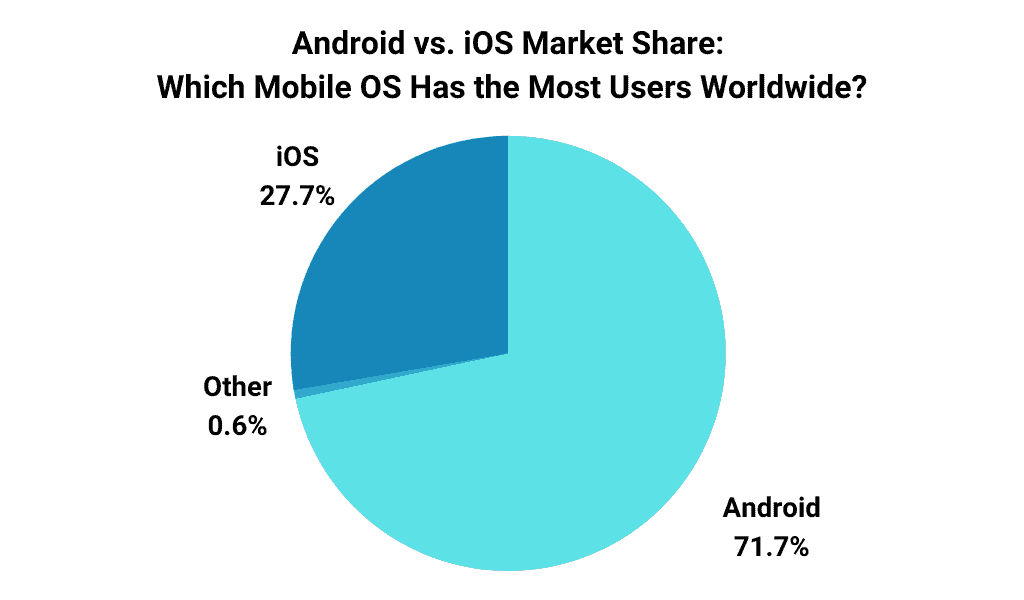
| Operating System | Quarterly Market Share |
| Android | 71.63 |
| iOS | 27.71 |
| Samsung | 0.35 |
| KaiOS | 0.12 |
| Windows | 0.02 |
| Linux | 0.01 |
| Other | 0.15 |
Tips: Leverage the potential of cross-platform frameworks like React Native to significantly reduce app development expenses by approximately 50 percent while also accelerating your time-to-market by 1.5 times. Even if your initial focus is on a specific platform like the iPhone, which holds a significant share in the US smartphone market, adopting a cross-platform technology stack ensures future scalability across multiple platforms with ease.
Mobile App Development Cost Based On Complexity Of Features
Here are the ways in which the features of an app can impact the cost of app development:
1. Complexity And Number Of Features
The more complex and numerous the features of an app, the greater the development effort required. Each additional feature adds to the overall development time, which can increase costs accordingly.
2. User Interface (UI) Design
A well-designed UI with attractive and intuitive elements can enhance user experience and engagement. However, creating a visually appealing and user-friendly interface may require additional design work and expertise, contributing to higher development costs.
3. Integration Of Third-Party APIs
Incorporating functionalities from third-party APIs, such as payment gateways, social media platforms, or mapping services, can enhance the app’s capabilities. However, integrating and configuring these APIs often involves additional development effort and may incur licensing or usage fees, influencing the overall cost.
4. Customization And Personalization
Apps that offer extensive customization options, personalized user experiences, or tailored features require more development time and effort. The level of customization directly affects the complexity of the app, thereby impacting the development cost.
5. Data Input And Processing
Apps that involve complex data input and processing, such as forms, uploads, or data manipulation algorithms, require additional development time. The complexity of managing and manipulating data can increase development costs.
6. Backend Functionality
The inclusion of backend features like user authentication, database management, and server-side operations adds complexity to app development. These functionalities require additional development effort and infrastructure, contributing to higher costs.
7. Integration Of Analytics And Reporting
Incorporating advanced analytics and reporting capabilities allows app owners to gather valuable insights into user behavior and app performance. However, implementing robust analytics systems and customized reporting features involves additional development time and costs.
8. Device Compatibility And Optimization
Apps that need to run seamlessly across different devices and operating systems require additional testing, optimization, and compatibility adjustments. Ensuring a smooth user experience on various platforms can add to the development cost.
9. Ongoing Maintenance And Updates
The inclusion of complex features may require regular updates and maintenance to keep the app functioning smoothly. Ongoing support, bug fixes, and updates contribute to the long-term cost of app development.
10. Machine Learning
Machine Learning (ML) and Artificial Intelligence (AI) functionalities are increasingly gaining popularity in apps as they enable personalized content recommendations and predictive actions based on user profiles. However, implementing ML-powered features in an app can significantly impact the overall development costs, given the complexity involved in coding and integrating the necessary algorithms. Developing AI options for an app often requires substantial time and resources, with the process sometimes spanning several months.
It is advisable to consult with your app developers about leveraging platform-specific ML frameworks like Core ML for iOS and ML Kit for Android, as they can streamline the implementation process and potentially reduce costs. Opting for on-device ML functionality, which utilizes frameworks like Core ML and ML Kit, can also help minimize costs by eliminating the need for dedicated AI servers.
Mobile App Development Cost Based On Development Time
The cost of app development is directly linked to the required development hours. To meet urgent deadlines, companies can allocate additional developers. However, expedited completion within a shorter timeframe increases costs. Even the slightest modifications during development can necessitate significant restructuring, emphasizing the importance of thorough planning and specifications before commencing the project.
The duration of development plays a significant role in determining the overall cost, as more time requires additional resources and effort. It’s crucial to recognize the importance of time when budgeting for app development.
Determining the cost of one month of app development serves as a useful benchmark for budget analysis.
- A basic app can typically be developed within a month, with a team consisting of developers, a scrum master, and, if needed, a quality analyst.
- The hiring cost and rates for these roles impact the overall cost, but precise figures may vary.
- By understanding the cost implications of one month of development, it becomes possible to extrapolate the overall cost for different scales of app development.
- Simple functional apps with standard specifications usually take 3-5 months to complete. However, keep in mind that even simple apps can vary in complexity, so the exact cost would depend on the specific requirements.
- More comprehensive apps with custom features and design may require 4-9 months.
- Large projects involving multiple platforms and complex integrations often extend beyond 9 months.
- Collaborating with experienced professionals helps obtain accurate cost estimates and adapt the budget to specific project requirements.
Considering the time required to build different scales of apps enables project owners to anticipate the cost range associated with their app development. By collaborating with experienced professionals, accurate cost estimates can be obtained, and the budget can be adjusted to accommodate specific project requirements and complexities.
How Can The Cost Of App Development Be Determined?
There is a specific formula used to estimate the cost of developing a mobile application. This formula takes into account various factors related to the main stages of the app development process.
The formula can be expressed as follows:
Total Cost of Development = UI/UX Design Hours + App development hours (platform-dependent) + backend Hours × Hourly rate of Developers
By considering the hours required for UI/UX design, the app development hours based on the chosen platform, and the backend development hours, multiplied by the hourly rate of the developers, the total cost of development can be calculated.
Tips To Reduce Mobile Application Development Cost
Here are some tips to help reduce mobile application development costs:
1. Choose The Right Development Platform
- Opt for native app development if you require higher performance and more advanced features tailored to specific operating systems.
- Consider hybrid app development if you want to save time and effort by maintaining a single codebase for multiple platforms with limited features.
2. Focus On Building An MVP (Minimum Viable Product)
- Develop an app with essential features that provide value to your users.
- Avoid adding unnecessary features that increase the app’s size, slow down loading times, and may lead to more frequent crashes.
3. Stay Updated With The Latest Development Trends
- Keep abreast of technology advancements and UI trends relevant to mobile app development.
- By incorporating the latest trends, you can ensure that your app remains relevant and reduces the need for frequent maintenance.
4. Consider Outsourcing Development
- Instead of hiring an in-house team and freelancers, outsourcing app development to a specialized company can be cost-effective.
- Choose an outsourcing partner based on your requirements and leverage the expertise of a professional team to reduce development costs.
5. Implement Continuous Testing
- Addressing bugs and errors throughout the development process is crucial to deliver a polished app.
- Conduct regular testing and debugging to identify and resolve issues, ensuring a smooth user experience.
- By catching and fixing issues early on, you can avoid costly rework or negative impact on your brand image.
6. Optimize App Performance And Efficiency
- Focus on optimizing code, reducing unnecessary dependencies, and improving overall app performance.
- Implement techniques like caching, data compression, and image optimization to minimize data usage and improve loading times.
7. Leverage Open-source Frameworks And Libraries
- Explore the availability of reliable open-source frameworks, libraries, and tools that can accelerate development and reduce costs.
- Utilize community-supported resources to leverage existing functionalities and avoid reinventing the wheel.
8. Efficient Project Management
- Employ agile project management methodologies to streamline development processes and ensure effective communication within the team.
- Break down the project into smaller tasks, set realistic milestones, and regularly evaluate progress to minimize delays and optimize resource allocation.
9. Consider Long-term Scalability
- Plan and design the app architecture with scalability in mind to accommodate future growth and feature enhancements.
- Anticipate potential changes and ensure that the app’s structure and codebase can easily adapt and scale without requiring significant rework.
10. Optimize User Interface (UI) And User Experience (UX) Design
- Invest time and effort in designing an intuitive and user-friendly interface that enhances the overall user experience.
- Conduct thorough user research and testing to identify and prioritize the most important features and design elements.
- Simplify complex workflows, eliminate unnecessary steps, and ensure a seamless and engaging user journey.
- By focusing on efficient UI/UX design, you can minimize development iterations, reduce rework, and improve user satisfaction, ultimately saving on development costs.
Outsource Mobile App Development
When it comes to mobile app development, clients often face the decision of choosing between freelancers and app development companies. So let’s compare these two options across various criteria to help you make an informed choice.
The key criteria under examination are price, quality, customer service, and dependability. You must consider these factors when choosing between freelancers and app development companies. While freelancers may be a suitable option for price-conscious clients, those seeking high-quality work, superior customer service, and enhanced dependability are recommended to opt for app development companies.
Freelancer vs. App Development Company
Below is a differentiation table comparing freelancers and mobile app development companies based on the given information:
| Criteria | Freelancer | App Development Company |
| Price | Cheaper | Higher cost |
| Quality | Not assured | Highly tested and checked |
| Customer Service | Limited service from developers | Dedicated project manager for updates |
| Dependability | No registered company | Registered company with a brand reputation |
1. Price
- Freelancers offer a competitive price advantage since they have lower overhead costs compared to app development companies.
- App development companies typically have higher costs due to the resources involved, such as designers, project managers, testers, and sales teams.
2. Quality
- Freelancers may not provide assured quality as they are responsible for their own quality assurance.
- App development companies ensure high-quality work by conducting thorough testing and employing project managers and testers.
3. Customer Service
- Freelancers, being individuals or small teams, may have limitations in providing extensive customer service.
- App development companies offer better customer service through dedicated project managers who handle updates and ensure timely delivery.
4. Dependability
- App development companies are more dependable as they are registered entities with a brand reputation to uphold.
- Freelancers, being individuals without registered companies, may pose challenges in terms of legal action or accountability.
Tip: If cost is a major concern and the client is price-constrained, choosing a freelancer can be a viable option. However, for clients seeking high-quality work, better customer service, and enhanced dependability, it is highly recommended to opt for app development companies.
Things To Look Out For When Choosing an App Development Company
When choosing an app development company, there are several important factors to consider. Here are some things to look out for:
1. Experience And Expertise
- Evaluate the company’s experience in app development, specifically in your desired platform (iOS, Android, cross-platform).
- Look for a track record of successful projects and check their portfolio to assess the quality of their work.
- Consider their expertise in relevant technologies, frameworks, and industry-specific requirements.
2. Client References And Testimonials
- Request client references or look for testimonials and reviews from previous clients.
- Reach out to their clients directly to gather feedback on their experience with the development company.
- This will help you gauge the company’s professionalism, communication, and overall client satisfaction.
3. Development Process And Methodologies
- Inquire about their development process and methodologies, such as Agile or Waterfall.
- Ensure that their approach aligns with your project requirements and expectations.
- Look for transparency, regular communication, and the ability to adapt to changes during the development cycle.
4. Team Composition And Expertise
- Assess the company’s team composition, including developers, designers, testers, project managers, and other relevant roles.
- Consider the expertise and qualifications of their team members in terms of technical skills, industry knowledge, and project management capabilities.
- A well-rounded and experienced team will contribute to the success of your app development project.
5. Communication And Collaboration
- Effective communication and collaboration are crucial for a successful development partnership.
- Evaluate their responsiveness, clarity in communication, and ability to understand and address your requirements.
- Ensure that they have established channels for regular updates, feedback, and addressing any concerns or issues that may arise.
6. Development Cost And Budget
- Obtain detailed cost estimates and ensure they align with your budget constraints.
- Be cautious of companies that provide significantly lower quotes as it may indicate compromised quality or hidden costs.
- Transparency regarding the cost breakdown and payment terms is essential for a clear understanding of the financial aspects.
7. Post-development Support And Maintenance
- Inquire about the company’s post-development support and maintenance services.
- Understand their approach to bug fixing, updates, and ongoing app maintenance to ensure long-term app stability and performance.
- Clarify the support and maintenance costs, duration, and response time in case of any issues or enhancements needed.
8. Intellectual Property Ownership And Security
- Discuss and clarify the ownership of the app’s intellectual property rights.
- Ensure that the company follows industry-standard security practices to protect your app’s sensitive data and user information.
9. Scalability And Future-proofing
- Assess the company’s capability to handle the scalability of your app as your user base and features grow.
- Consider their ability to accommodate future updates, enhancements, and integrations to keep your app up-to-date.
10. Contract And Legal Considerations
- Review the contract terms and conditions thoroughly.
- Seek legal advice, if necessary, to ensure that the contract protects your interests and covers key aspects such as confidentiality, deliverables, timelines, and dispute resolution.
By considering these factors, you can make an informed decision when choosing an app development company that aligns with your project goals, requirements, and budget.
5 Best App Development Service Provider In Singapore
1. Idea Usher
- Best for: Advanced, Basic, and Web3 app development
- Website: Ideausher
- Services:
- Web Development
- Mobile App Development
- VR App Development Services
- Game Development
- Internet of Things
- AI And ML Development Services
- Chatbots
- Project Management
- Digital Marketing
- Blockchain Development
- Blockchain Game Development
- Cross-Chain NFT Development
- App Development Company
- Metaverse Development
- NFT Development
- Smart Contract Auditing
- Solana Blockchain Development
2. Vinova
- Best for: Diversified app development needs
- Website: Vinova
- Services:
- Mobile application development
- Mobile games development
- Social application development
- Ruby on Rails development
- Penetration testing
- Web application development
- Big data, cloud computing, and business intelligence
3. Codigo
- Best for: Customized web development services
- Website: Codigo
- Services:
- Web development
- Interface design services
- Coaching services
- Mobile app development
- Testing services
- Consultancy services
4. Singsys
- Best for: Fixed price projects
- Website: Singsys
- Services:
- Digital marketing
- Design studio
- Hosting and cloud
- Web application development
- Mobile application development
- Software testing services
- Outsourced product development
5. Swag Soft
- Best for: App development with AR and VR
- Website: Swag Soft
- Services:
- Enterprise apps development
- Mobile apps development
- Game development
- VR development
- AR development
Conclusion
Developing a mobile app can be a daunting task, but it doesn’t have to be. By working with a reliable mobile app development company like Idea Usher, you can ensure that your app is developed within your budget and meets your exact requirements.
Idea Usher has a team of experienced developers who are well-versed in the latest technologies and best practices. They will work with you to understand your needs and create an app that is both user-friendly and visually appealing.
In addition, Idea Usher uses a proven agile development process that ensures that your app is developed in a timely and efficient manner. This means that you will be able to get your app to market faster and start generating revenue sooner. If you are looking for a reliable mobile app development company, contact us today. We will help you bring your dream app to life.
Here are some additional benefits of working with Ide Usher:
- We offer competitive pricing.
- We have a proven track record of success.
- We are committed to customer satisfaction.
- We are available to answer your questions 24/7.
Contact us to learn more about how we can help you develop your mobile app.
Contact Idea Usher at [email protected]
Or reach out at: (+1)732 962 4560, (+91)859 140 7140
FAQ
Q. What factors affect the cost of creating an app in Singapore?
There are several factors that affect the cost of creating an app in Singapore, including:
- The complexity of the app
- The features that the app will include
- The platform(s) that the app will be developed for
- The experience and expertise of the development team
- The time it takes to develop the app
Q. How can I reduce the cost of creating an app in Singapore?
There are several ways to reduce the cost of creating an app in Singapore, including:
- Choosing a simpler app with fewer features
- Developing the app for a single platform
- Hiring a less experienced development team
- Using a development framework that can be used to create cross-platform apps
Q. What are the benefits of developing an app in Singapore?
There are several benefits to developing an app in Singapore, including:
- The availability of a skilled and experienced development workforce
- The relatively low cost of development
- The government’s support for the tech industry
- The proximity to major markets in Asia













Rebecca Lal